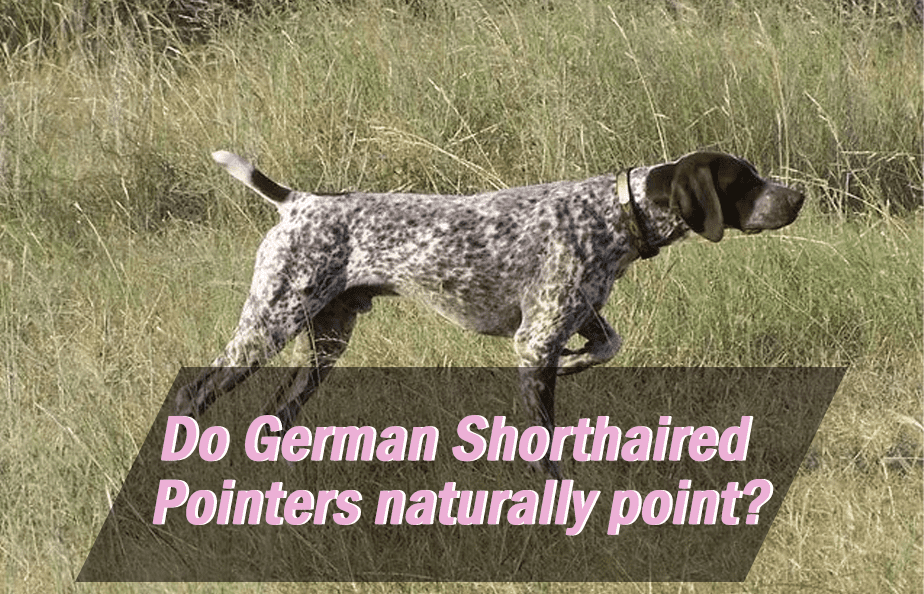Wondering if your German Shorthaired Pointer would point naturally or through training? Let’s look for some answers here.
German Shorthaired Pointer is a sporting dog breed originally bred in the 19th century for hunting. It is a highly energetic and active dog that can be a great companion to take on treks and hikes with proper training and care.
Their unique characteristics are many, one of them being that they have one of the sharpest senses of smell- ideal for hunting. Nowadays, they are bred mainly by people who partake in outdoor activities, considering they are more useful in such situations.
It is easy to deduce that their name comes from their practices- German Shorthaired Pointer; i.e., they point. When hunting or looking for a game, they would expressly point in the game’s direction without alerting the prey.

Along with their sharp skills, they are also witty and useful in many situations. It is similar to other pointer dogs but also very different at the same time.
People always have questions regarding GSPs and their pointing abilities. In this article, we will help to answer some of those, like:
- Do German Shorthaired Pointers point naturally?
- What age do GSPs start pointing?
- How do I teach my GSP to point?
- Are GSPs similar to other pointer dogs?
- Do pointers point naturally?
Do German Shorthaired Pointers Point Naturally?
German Shorthaired Pointers are energetic dogs who trust their instincts more than anything. They are natural pointers, courtesy of generations of hunting, and can easily sniff out raccoons, rabbits, deer, etc.
GSPs don’t need hardcore training to point; it is an instinct embedded in their minds from an early age. When a German Shorthaired Pointer detects prey, they lower their heads while slowly lifting a front paw to indicate the direction of the target, all without breaking their gaze from it.
Pointing is a practice dogs use when they sense a quarry and need to inform the hunters without alerting or scaring the prey. They usually do this by freezing their bodies and gazing hard at their prey, as if anticipating it, and raising a paw, like an arrow, to point.
Their instinct to the point didn’t develop overnight- they owe it to generations of GSPs that perfected their hunting skills day and night on hunt. Today, through evolution, GSPs have a natural instinct to sniff out the game in the blink of an eye.
Hardcore training isn’t required for pointing; however, GSPs need to be subjected to simulations to test their abilities. Mental and physical exercise can help maintain their wit and naturally help them to test their limits.
What age do German Shorthaired Pointers start pointing?
It is always advisable to inquire about training habits from the breeder where you got your pup; however, in the case of GSPs, it is usually believed that the earlier the training starts, the better. This will help sharpen the instincts from an early age.
GSPs are suitable to be trained for around 12 weeks, and training basics like fetching and navigating is an excellent place to start. Gradually, you can introduce them to game birds to familiarize them with the smell.
As pups, give them a little free reign, and you can gradually work on calming down their excitement levels and get them to focus. Once they have gotten familiar with this practice, they will be able to seek out games themselves the next time they are outdoors. However, it will require a lot of patience and training before they get there.
Again, while practicing with a live game, be careful to have GSPs on a leash; in the early stages, they won’t be able to contain their excitement and probably bolt as soon as they sniff out the game. GSPs need more practice to stay calm rather than the actual hunting.
Also, not every GSP dog is the same, so what works for one might not work for the other. Also, if their development paces are different, one may take a little longer than the other to learn to fetch and hunt.
How do I teach my German Shorthaired Pointer to point?
As much as it is a natural instinct perfected by practice, GSPs need some training to get their instincts right. Even though pointing is second nature to them- it is also learned; mostly observing other GSPs use their abilities on hunts and outdoor activities can also benefit your GSP.
Finish training the basics to your GSP; then, you can make them graduate to sniffing live game. When your dog is well trained in basics like when to stay still, fetch, and sprint, they are ready to be trained for live game situations.
Bring your dog with you to the place where you train them, and make them stand in the same spot from where they found the game. Tell them to “whoa” and make him stay still in the same spot to avoid alerting the game.
Most likely, it will take a few sessions of this until they get the point and start doing it naturally. However, make sure that if you aren’t in a yard, your GSP is on a leash and cannot sprint out of sight all of a sudden.
Are GSPs similar to other pointer dogs?
Pointer dog breeds tend to be highly enthusiastic, energetic, and playful. They are skilled in many dog sports and are excellent retrievers; as a bonus- they also know how to swim. All pointer dogs require a good amount of exercise and mental simulations to keep them on their paws.
One thing common in all pointer dogs is that they are all hunter dogs, and they can all point, by instinct, in the direction of the game. But while all pointer dogs may be used for outdoor activities, not all characteristics are similar.
English Pointer dogs are generally used as field dogs for birds, while GSPs are well suited for hunting almost any game: raccoons, deers, rabbits. GSPs and English Pointers weigh almost the same, but English Pointers stand taller than GSPs.
GSPs also have a good temperament and are kid-friendly. They can also easily get along with other dogs or other breeds; however, they can be seemingly aggressive towards the opposite sex.
Do pointers point naturally?
Pointer dogs get their name from their instinct of pointing. They can pick up a scent from a distance and raise a paw while standing still, pointing.
Pointer dogs have this ability ingrained into their psychology from an early age; they have mastered the art of pointing hunters in the game’s direction without alerting them. This perfection results from generations of practice which led to pointing becoming almost second nature to the species.
Though it is somewhat ingrained, it is also a learned behavior. What a pointer knows by instinct takes him to practice and patience to perfect. It is also not the same type of stance for every pointer dog.
While some pointer dogs might still point a paw in the game’s direction, some other pointer dogs might stay entirely still with their gaze locked on their prey, while others might be ready to pounce and kill once they have managed to secure their prey.
Sometimes, a pointer dog might stay entirely still while its tail may be moving- this means that the prey is moving and isn’t standing in one place. The owner of a pointer dog needs to understand and get used to their dog’s body language, which will only make the process easier and quicker.
Conclusion:
German Shorthaired Pointers breed pointer dogs primarily bred for hunting and actively used for outdoor activities. It is excellent in swimming, retrieving, and other dog sports. It is also a hyperactive dog and must be taken outdoors regularly for exercise and practice.
Pointers are not suitable for prolonged indoor stays, and GSPs are bred for game hunting. As for the actual hunting, the GSPs have an instinct; however, they need help to polish their skills and be ready to assist in actual hunting situations.
Starting with basic skills like fetching, GSPs can gradually be taught the smell of the game, point when they smell it and stay still. It is better to put them on a leash if not practicing in a private yard since they can sprint anywhere in seconds.
They are similar to other Pointer dogs, even if not entirely similar. The basic instincts of pointers are the same- they point in the direction where they sense the game. Also, GSPs are preferable over other pointer dogs as they can sense different types of animals, while some pointer dogs can only assist in the case of game bird hunting.
An essential duty of a GSP owner will be to learn and understand your dog’s body language- to make the partnership work better.

